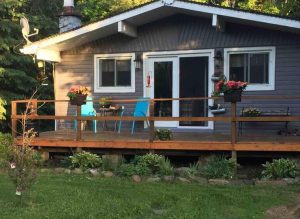
They’ve been packing up for weeks. RVs all loaded. Trailers full of motorboats, Sea-doos, kayaks, flotation devices and other water paraphernalia. Oh, and they’ve got plenty of camping gear too, with food coolers and bug repellent crammed into every nook and cranny of their cars and trucks.
I asked one of my neighbours, heading out of town, how long he’d been getting ready for this summer’s great escape to the cottage.
“Since we got home from the cottage last year,” he said.
Recently, I’ve been thinking about all my friends dashing off to cottages each summer. There are a lot of them. I checked a fairly recent Statistics Canada survey and the numbers are noteworthy. In 1977, just under six per cent of Canadian households (about half a million people) owned vacation homes. (That could be a cottage by the lake, a cabin in the woods, or a recreational vehicle spot in a camping park).
It took another 20 years or so, but that number crept up to just short of a million Canadians, or about seven per cent around the year 2000. Lately, however, it appears the bloom’s kind of off the rose out there in cottage country.
Based on anecdotal experience, I think I could have predicted that. Many years ago, when I was 10 and my sister was seven, my parents (who’d both grown up in New York City and craved something that didn’t look like Queens or Manhattan) bought a narrow piece of property on the west side of Lake Simcoe.
My dad used to say, “Our cottage is so close to the one next door, we can hear our neighbours when they sneeze.”
Still, that sliver of land with about 25 feet of frontage along what was then just a beach area called Belle Ewart, was heaven for my folks. It turned out to be a mecca for all my American relatives too – grandparents, aunts, uncles and cousins, who heard about our Lake Simcoe cottage and made it their go-to summer vacation spot too.
And that’s fine. My folks loved sharing their good fortune with the wider family.
The only problem with our summertime property at the lake – as narrow and insignificant as it was – was that it required nearly as much maintenance as our home back in Toronto.
There were the internal items, such as maintaining the running water system in the summer and then completely draining it before the temperature dropped at Thanksgiving. We had a small heater that needed 24/7 tender loving care, and a couple of appliances we’d picked up at auction sales, I think.
But most of the maintenance was outside stuff – cutting the lawn, trimming hedges, repairing the dock, hauling a small boat (we’d picked up for my grandfather) in and out of the water, and (when they descended each summer) clearing the cottage windows and screens of fishflies. Ugh! I developed a love/hate relationship with our cottage, loving the escape to the sun and sand, but dreading the forced summer labour.
Over a couple of beers the other night, some friends explained that their cottage has never had a lawn, that it just has the bare minimum of facilities – running water, septic tank, fridge and stove, etc.
But what makes it most attractive, they said, is that it’s “a water-access cottage,” meaning it can only be reached by boat. In a day when most cottage properties pride themselves with road access, driveways, garages and all the conveniences of a city home, “water access” probably scares off unwanted guests or maybe even family members dreading the maintenance chores at the lake.
Returning to some statistics, despite what most believe is an insatiable Canadian appetite to own vacation property, those statistics from 25 years ago haven’t really changed much.
Remember the six or seven percent of us who owned cottages back in 2000? Well, an Ipsos poll says currently only eight per cent do today; that’s likely a product of inflated prices for vacation properties the past few years and higher priorities of keeping a job and paying the bills.
Perhaps more interesting, that same Ipsos survey points out that one in six Canadian cottage owners is looking to sell it sometime in the next two to three years. I guess that explains why all my neighbours have been rushing to get out of town this summer.
If it’s only going to be there for a couple more years, better to make the most of it, before it goes to seed or gets sold by its benefactor.